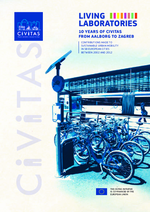
Gorna Oryahovitsa (Bulgaria)
The municipality of Gorna Oryahovitsa in the north of Bulgaria consists of two towns and 12 villages on an area of 318 km². There are 52,000 people of which 35,000 live in the administrative centre, the town of Gorna Oryahovitsa. The existing transport system cannot cope with the steep increase in car and truck traffic through the city centre.
Situated between sub-Balkan valleys and the Danube River, Gorna Oryahovitsa attracts numerous tourists to various archaeological sites dating from the third millennium BC. A wealth of old churches, monasteries and cultural monuments add to the area’s appeal. Following the construction of a stone bridge by the first prince of modern Bulgaria Alexander Battenberg in 1880, Gorna Oryahovitsa became connected with surrounding cities. It subsequently developed into one of the most important transport centres in the country with a large railway junction that serves an estimated six million passengers a year.
A lot of local and transit freight traffic passes through the centre causing traffic problems, noise and deteriorating air quality. A lack of parking facilities exasperates problems in centre. Thirteen bus lines currently run in the city of Gorna Oryahovitsa. An average of 270 buses passes through the downtown area every day, even though they tend to be rather empty. As they are running on conventional diesel engines, they contribute to the emissions from cars that are concerningly high in some parts of the city.
In response to these issues, Gorna Oryahovitsa is the first Bulgarian town to join the CIVITAS Initiative. Within the RENAISSANCE project, the city wants to learn from other cities’ experience. Its goal is to prepare a strategic plan and perform small tests on the identified problems with an eye to long-term interventions. Gorna Oryahovitsa wants to change citizens’ travel habits in the long run to transform the transport situation in a sustainable fashion rather than attempting to look for quick fixes. The city wants to share its experience with other cities in Bulgaria and take on a leading role in the development of sustainable urban mobility in Europe.


















